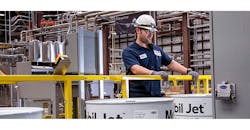ExxonMobil Becomes First Petroleum Company to Get Zero Waste to Landfill Silver Validation
ExxonMobil announced on Dec. 11 that due to the fact that its lubricant operations is successfully diverting over 90% of the waste produced in its global plant network from local landfills, it has received the received the Zero Waste to Landfill Silver validation from UL.
The company is the first petroleum products company to secure this validation.
"For a company like ExxonMobil, which has operations facilities across the globe, achieving UL’s Zero Waste to Landfill Silver validation is no easy feat,” said Alberto Uggetti, general manager at UL. “The program’s rigorous validation process is designed to recognize companies that handle waste in environmentally responsible and innovative ways, and ExxonMobil has implemented a comprehensive, far-reaching program that meets this rigor and reflects its commitment to operating in an environmentally responsible way.”
To achieve the validation, ExxonMobil implemented a range of waste diversion techniques and strategies across its lubricant production network. Specifically, the company identified 14 types of waste produced at these facilities that could either be avoided entirely, reused or recycled. More than 50,000 tons of waste produced per year are being redeployed into new, productive uses that will bring greater value to the environment and the economy, ExxonMobile says.
UL’s waste diversion validation program monitors and measures material flows in and out of facilities. It provides an objective basis for quantifying waste diversion rates so that consumers can more accurately assess claims and make meaningful comparisons between waste diversion rates among competing organizations.
To achieve these results, ExxonMobil engaged UL in a rigorous, multi-year process, which included readiness assessments, pilot programs, and extensive examination of documentation and on-site practices for final validation. From operations, research and engineering to marketing and sales, each team played an integral role in helping to achieve the validation.
ExxonMobil began developing this waste management program in 2012 and by 2015, had implemented it across the globe. Examples of these programs include implementing a device to safely drain aerosol cans in an environmentally conscious manner, allowing the metal and liquid to be recycled in Port Allen, Louisiana and, in Serviburnu, Turkey, implementing a simple distillation process to recover laboratory solvent.
About the Author
IW Staff
Find contact information for the IndustryWeek staff: Contact IndustryWeek
